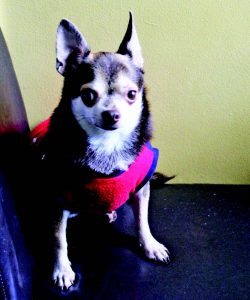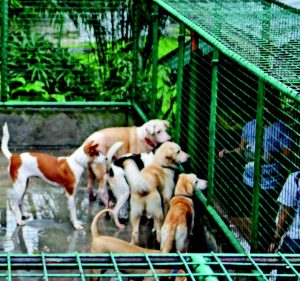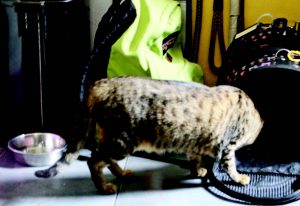Those of us who’ve adopted our fuzzy favorites from places like the Philippine Animal Welfare Society (PAWS), Compassion and Responsibility for Animals (CARA), and the Philippine Society for the Prevention of Cruelty to Animals will know that there are few joys comparable to the experience. We spoke to Tere Bondad, an advocate for the Philippine Animal Welfare Society, about how she started becoming a familiar face at the MARILAQUE Highway-Katipunan branch and how spending time there has changed her life.
WHEN DID YOU START GOING TO PAWS?
Tere (T): “2013. So it’s been a while!”
WHAT BROUGHT YOU TO PAWS IN THE FIRST PLACE?
T: We had a poodle who was bleeding, and we didn’t know why. The vet near our house… [how do I say this]… there was no feeling of trust. They didn’t answer all of our questions about our dog.”
BECAUSE THEY COULDN’T OR THEY WOULDN’T?
T: “I really don’t know. But they just told us to get these meds and those meds, never really saying why or what for. Then I brought the poodle to PAWS and the resident vet actually got angry at me! But at the same time it was kind of a relief to know that he really cared about my dog, and that he was confident, and that he knew what he was doing. I thought he must be frustrated about this newbie with a bleeding dog and they have no idea what they’re doing! And then he asked me what I wanted–if I wanted to have my dog put down.”
WHY?
T: “I know! And I got angry, too. I figured maybe we got off on the wrong foot. I thought about [it]; listen, I’ve got nowhere else to go. I came to you for help. But then I realized that he would only ask that if he’s seen a lot of things [like neglect, carelessness, nonchalance from other pet owners]. So I totally understood the anger. There are a lot of cats and dogs out there being mistreated.”
SO YOU KEPT GOING BACK?
T: “Yeah, because… well, he answered all my questions as best he could. Gave me my dog’s medications and explained them. And he seemed concerned and competent. And what I really want to point out is, sure, it can seem pricey. Especially at first, and especially for me at the time because I was shouldering the expenses, but I wanted to save this dog.”
YOU CAN’T PUT A PRICE ON THAT KIND OF LOVE.
T: “Exactly!”
SO YOU STARTED GOING BACK TO VOLUNTEER?
T: “Not quite yet? I pretty much established that we had more than one dog that needed veterinary attention, and I let them know that first and foremost, my dogs needed help. But then I started becoming a familiar face, and getting to know volunteers, and even some of the emergency cases brought in. You start asking what’s going on long enough, you can answer questions about that one dog, or that other cat…”
ANY CASES THAT STICK OUT IN YOUR MIND?
T:There was this one dog who swallowed [a large mango seed]. And I’m like, okay. And they’d tell me I’d have to wait because something like that would happen, and of course I’d understand! What’s a couple more hours if another dog gets saved, or a cat can get away from a physically abusive owner?”
AND THAT ALSO MADE A DIFFERENCE FOR YOU?
T: “Yeah, because it tells me that they don’t operate in terms of time or money, but really, in terms of focus. You pay for the check-up, the meds, the operation, whatever, the necessary stuff. Not for how long it takes, or to become their priority.”
THEN WHAT MADE YOU VOLUNTEER? THOSE CASES?
T: “That, and I was learning about their advocacy. A good number of shelters share the same mindset that there will be fewer stray dogs and cats if people knew more about spaying and neutering. And that made sense to me, as an educator, and it’s something we have to keep passing on. Because a lot of our problems are like this–they can be solved and prevented when we are collectively more responsible.”
THAT’S AN INCREDIBLE TAKEAWAY.
T: “Well, if people know—I think it helps on a larger scale, too. To know that there are these individuals who care about these beings that can’t communicate the way we know how. And I mean, I was just going for my dogs, and establishing my presence there, and they got to know me too, and I learned a lot. Because of my many dogs. Haha!”
SO WHAT MADE IT IMPORTANT FOR YOU TO VOLUNTEER? WHAT DOES IT BRING TO YOUR LIFE?
T: “Well, they run on volunteers, and the primary complaint is that they’re undermanned. They helped me, so I pitched in because they needed help too. You do what you can, because you’re always given a decision: [are you going to be a burden or are you going to help]? And aside from that, I guess it’s also about counteracting, well… I have a relative who used to be a breeder.”
DID YOU FEEL GUILT ABOUT THAT?
T: “[Yes]. And that’s how I grew up, with all these different dogs in the house but never knowing how to care for them properly. So in a way I’m also making up for that, even though I could never…”
YOU TRY, THOUGH.
T: “I mean, like to think that’s what counts. Also, I can’t even guarantee that your pets will reciprocate, especially because of that communication barrier between species. But then it’s also that barrier that makes their affection mean so much more. Somehow you know.”
AND ON A MORE—FOR LACK OF A BETTER WORD—SELFISH LEVEL, HOW HAS IT AFFECTED YOU?
T: “I’ve come to realize, through friends and fandoms, when you’re at the end of your rope, emotionally… what matters then, in the scheme of everything, is that you can look back and remember the little things you did for others, especially those who can never repay you. And that gives you strength; you made yourself matter. Overall, though? It makes you feel different. You won’t get a medal but you did something good.”
This appeared in Animal Scene magazine’s December 2017 issue.








